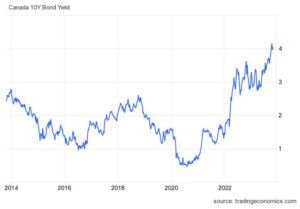There weren’t many places to hide this summer as all major asset classes ended up down in the third quarter. Bonds took the worst hit, falling by almost 4% as yields breached multi-year highs. Equities did not fare much better as both domestic and international stocks dropped by more than 2% and US equities fell over 3% in local currency (but just over 1% in Canadian dollar terms). Negative sentiment picked up speed later in the quarter as surprisingly strong economic data pushed expectations of restrictive central bank policies to remain in place longer, and possibly even accelerate in the near term.
If you look back at the benchmark Canada 10-year bond yields, they have been hovering between 0.5% to 2.5% for the better part of the past decade until 2022 when they shot up and continue to grind higher (see chart below).

Higher bond yields make it expensive for consumers and businesses to borrow, which should be negative for economic output and place downward pressure on prices. At the same time, investors buying bonds now can earn roughly 8 times more in bonds than they could have back in early 2020. Investors, however, have a tendency to look backwards at past performance, and if you see the 3-year return on bonds in the summary section below, -5.14% probably does not inspire a lot of confidence! As we commented in our blog post: Bonds, they’re not so bad, it’s not about what has happened, it is about what is going to happen.
To be clear, we don’t believe that bond yields will be coming back down to 2.5% or lower within the next quarter, or even the next year, but there is good reason to believe that the current level of high interest rates cannot be sustained for the long term, meaning they will come down at some point. Higher yields now, combined with lower future interest rates means significantly better bond returns going forward. So do not be discouraged by recent returns of the bond market, and please make note of the fact that Justwealth has positioned fixed income portfolios quite conservatively since our inception.
When it comes to volatility, bonds pale in comparison to equities – by a wide margin. So as bad as it has been for bonds, it can be much worse for equities. But, it works in both directions: equities also possess quite a bit more upside potential compared to bonds. Therefore, shifting large amounts of assets from bonds to equities, or vice versa, can be a very dangerous adjustment because you ultimately change risk levels, which could also be interpreted as market timing. Any time that Justwealth contemplates changes to portfolios, they will typically be modest, and usually confined to adjusting positioning within the broad definitions of equities and bonds, based on a long-term outlook.
An even more extreme example of market timing is when investors shift assets from equities to cash (which essentially has no volatility). You can earn interest on cash balances by investing in things like GICs or HISA ETFs, and at the present time, the interest rates being offered are higher than historical averages. But we only recommend this option for very short-term time horizons when you absolutely need to spend your cash. If you have not read our recent article: GICs: The Worst Investment Ever?, please do so to see the potential pitfalls from investing in GICs.
Regarding equities, the thought of higher interest rates for longer has recently hampered the prospect for returns, and the rise of geopolitical unrest in the Middle East has exacerbated those concerns. Although armed conflict can be very unsettling and tragic, the Middle East has been in a state of unrest for decades. Furthermore, it has been more than a year and a half since war broke out between Russia and Ukraine and over that time period equity markets have performed quite well, despite short-term periods of volatility. From a purely financial perspective, we do not view the current geopolitical unrest as a serious impediment for future long-term returns.
As we head into the final few months of 2023, we encourage all clients and financial partners to review their accounts and start planning for 2024. If you have any investment-related questions, please reach out to your Personal Portfolio Manager.
Here is a recap of market performance as of September 30, 2023*


Comments are closed.